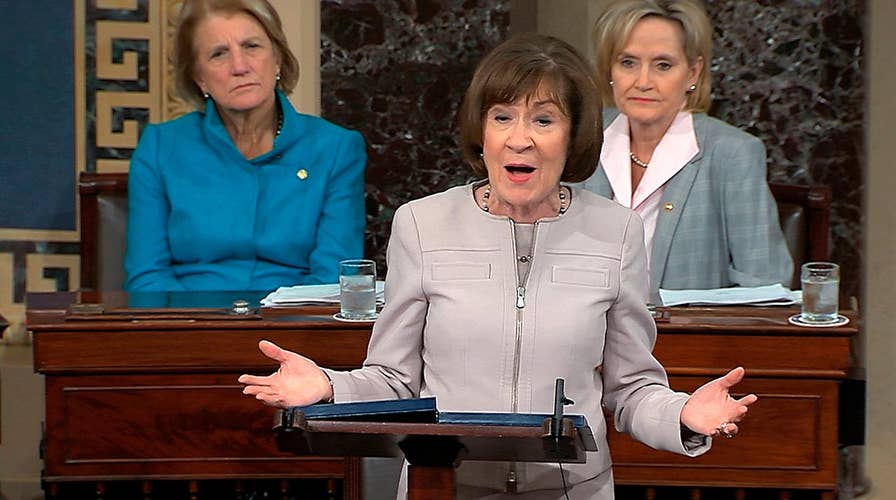Sen. Collins announces intention to vote for Kavanaugh
Republican Senator Susan Collins from Maine explains her decision to vote to confirm President Trump's Supreme Court nominee Judge Brett Kavanaugh.
Sen. Susan Collins, R-Maine, did the most amazing thing on the floor of the U.S. Senate on Friday: She spoke rationally. That’s something you rarely see in Congress.
In a dramatic floor speech, Collins explained her decision to support the nomination of the highly qualified Judge Brett Kavanaugh to the Supreme Court. Her remarks were thorough, sequenced, logical and convincing. She spoke from the heart and what she said made sense.
And with Collins’ announcement and the announcement of Sen. Joe Manchin, D-W.Va., that he will also vote in favor of Kavanaugh’s confirmation, Kavanaugh has a clear path to Senate confirmation this weekend – unless any senator makes a surprise change in his or her announced voting plans. At this point, 51 senators in the 100-member chamber have said they plan to vote to confirm Kavanaugh.
Sen. Lisa Murkowski of Alaska is the only Republican who has said she will vote against Kavanaugh’s confirmation.
Over the past couple of weeks numerous conservative commentators, myself included, have publicly laid out arguments in support of Kavanaugh’s confirmation by the Senate. We’ve pointed out the various flaws, inconsistencies and non-sequiturs of the arguments posed against the confirmation of the judge, who has served on the U.S. Circuit Court of Appeals for the District of Columbia for the past 12 years.
Collins used almost every single one of those arguments in her floor speech Friday. It was like listening to a greatest hits’ album of all the reasons why Kavanaugh should be confirmed.
I don’t necessarily think Collins has read or heard much or any of things those of us outside the process have written or said. I think that she has simply had a front row seat and has drawn her own conclusions from a corrupted process.
Collins had been one of the senators named as a swing vote in this process of confirming Kavanaugh – no one was sure how she would vote. She was identified that way because of her tendency over time to seem to want to be friendly or liked by her Democratic colleagues and members of the media.
On Friday she turned from friend to foe.
Collins did not become a foe in the petulant and screaming way that Democrats like Senate Minority Leader Chuck Schumer of New York and Cory Booker of New Jersey have come to symbolize. She became a foe because she clearly was no longer willing to set aside rational thought strictly for the sake of appeasement.
One by one she took apart every objection that has been raised against Kavanaugh. This included objections raised in the Women’s March statement released in July that condemned the nomination of “XX” by President Trump – meaning the group had decided even before Trump announced a nominee that it would oppose the person.
In her remarks Friday, Collins raised each particular objection that had been made against Kavanaugh and then recited facts to diffuse the objections, one by one. She did this systematically until every argument against his judicial record was eviscerated.
And then Collins turned to the uncorroborated sexual misconduct allegations made against Kavanaugh. Three women have accused the judge of such misconduct.
The accuser who has received the most attention is Christine Blasey Ford. She testified before the Judiciary Committee last week that a drunken Kavanaugh forced her onto a bed and tried unsuccessfully to take her clothes off some 36 years ago when both were in high school.
Ford said she feared Kavanaugh would rape her or that he might accidentally kill her when he covered her mouth to stifle her screams.
Kavanaugh has testified under oath that he never sexually assaulted Ford and has never sexually assaulted anyone. He also denied other allegations of sexual misconduct made against him.
The accusations against Kavanaugh were not corroborated by a single person other than Kavanaugh’s accusers or by any evidence. And a new FBI background investigation report on Kavanaugh that was reviewed by senators on Thursday and Friday found nothing that supported the accusations against the judge.
In her floor speech, Collins politely but unmistakably scolded the Senate for the devolution of the confirmation process. She reminded senators of notions of fairness, the presumption of innocence, and something new she introduced called the “more likely than not standard.”
Applying this more lenient standard instead of one of full-fledged reasonable doubt, Collins said that Ford’s statement simply did not pass even this test.
Collins said the process of Senate confirmation hearings has been deteriorating for 30-plus years and she hopes that this hearing process marked a hitting of bottom.
If the Senate process for giving advice and consent on Supreme Court nominations just hit bottom, then here is a piece of clearly good news: Susan Collins bounced.
Despite enormous pressure – including what amounted to a blackmail campaign that started raising money for her unknown Democratic opponent in 2020 should she vote to confirm Kavanaugh – Collins stood up for her principles and was a true profile in courage.
And sure enough, the Maine Democratic Party issued a statement Friday night denouncing Collins for her vote.
Collins has made it clear that she will stand up to Democratic bullies. She is a strong, intelligent and honorable woman who takes her job of serving her constituents and our nation seriously. And she deserves the thanks of all Americans.

